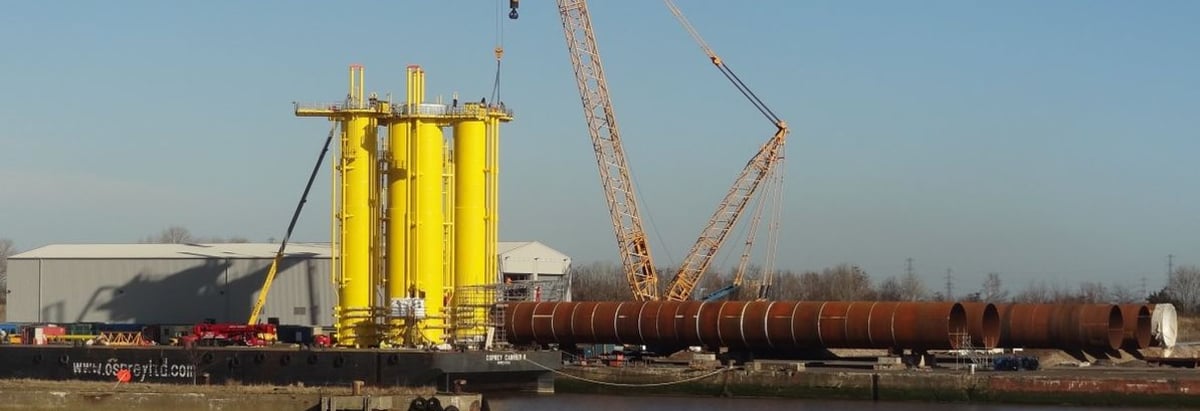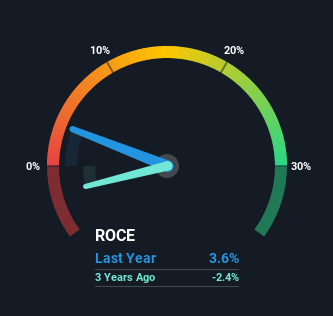Stock Analysis
- United States
- /
- Energy Services
- /
- NYSE:OII
Investors Could Be Concerned With Oceaneering International's (NYSE:OII) Returns On Capital

When researching a stock for investment, what can tell us that the company is in decline? Businesses in decline often have two underlying trends, firstly, a declining return on capital employed (ROCE) and a declining base of capital employed. This indicates the company is producing less profit from its investments and its total assets are decreasing. In light of that, from a first glance at Oceaneering International (NYSE:OII), we've spotted some signs that it could be struggling, so let's investigate.
What is Return On Capital Employed (ROCE)?
For those who don't know, ROCE is a measure of a company's yearly pre-tax profit (its return), relative to the capital employed in the business. The formula for this calculation on Oceaneering International is:
Return on Capital Employed = Earnings Before Interest and Tax (EBIT) ÷ (Total Assets - Current Liabilities)
0.036 = US$55m ÷ (US$2.0b - US$451m) (Based on the trailing twelve months to September 2021).
Thus, Oceaneering International has an ROCE of 3.6%. In absolute terms, that's a low return and it also under-performs the Energy Services industry average of 6.7%.
View our latest analysis for Oceaneering International

Above you can see how the current ROCE for Oceaneering International compares to its prior returns on capital, but there's only so much you can tell from the past. If you're interested, you can view the analysts predictions in our free report on analyst forecasts for the company.
The Trend Of ROCE
We are a bit anxious about the trends of ROCE at Oceaneering International. The company used to generate 6.2% on its capital five years ago but it has since fallen noticeably. In addition to that, Oceaneering International is now employing 44% less capital than it was five years ago. The fact that both are shrinking is an indication that the business is going through some tough times. Typically businesses that exhibit these characteristics aren't the ones that tend to multiply over the long term, because statistically speaking, they've already gone through the growth phase of their life cycle.
The Bottom Line On Oceaneering International's ROCE
To see Oceaneering International reducing the capital employed in the business in tandem with diminishing returns, is concerning. Long term shareholders who've owned the stock over the last five years have experienced a 58% depreciation in their investment, so it appears the market might not like these trends either. Unless there is a shift to a more positive trajectory in these metrics, we would look elsewhere.
If you want to continue researching Oceaneering International, you might be interested to know about the 2 warning signs that our analysis has discovered.
While Oceaneering International may not currently earn the highest returns, we've compiled a list of companies that currently earn more than 25% return on equity. Check out this free list here.
New: AI Stock Screener & Alerts
Our new AI Stock Screener scans the market every day to uncover opportunities.
• Dividend Powerhouses (3%+ Yield)
• Undervalued Small Caps with Insider Buying
• High growth Tech and AI Companies
Or build your own from over 50 metrics.
Have feedback on this article? Concerned about the content? Get in touch with us directly. Alternatively, email editorial-team (at) simplywallst.com.
This article by Simply Wall St is general in nature. We provide commentary based on historical data and analyst forecasts only using an unbiased methodology and our articles are not intended to be financial advice. It does not constitute a recommendation to buy or sell any stock, and does not take account of your objectives, or your financial situation. We aim to bring you long-term focused analysis driven by fundamental data. Note that our analysis may not factor in the latest price-sensitive company announcements or qualitative material. Simply Wall St has no position in any stocks mentioned.
About NYSE:OII
Oceaneering International
Provides engineered services and products, and robotic solutions to the offshore energy, defense, aerospace, manufacturing, and entertainment industries worldwide.
Solid track record with excellent balance sheet.

